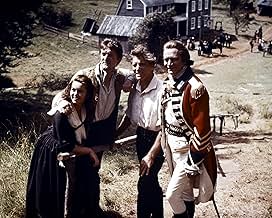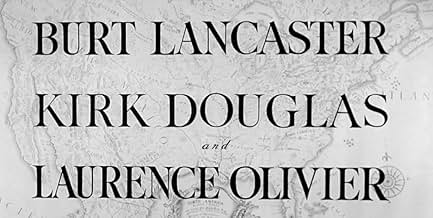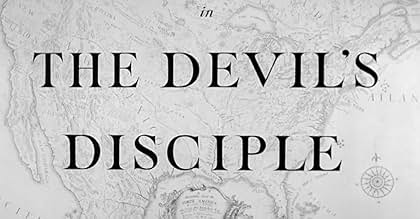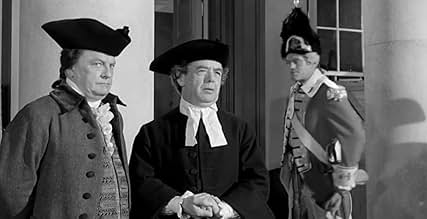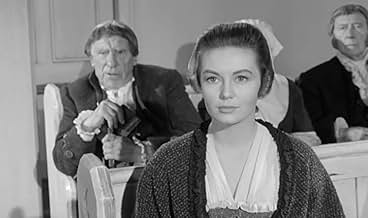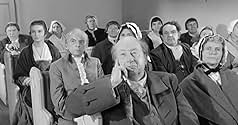IMDb-BEWERTUNG
6,9/10
3143
IHRE BEWERTUNG
Füge eine Handlung in deiner Sprache hinzuThe black sheep of a family and the local minister discover their true vocations during the Revolutionary War.The black sheep of a family and the local minister discover their true vocations during the Revolutionary War.The black sheep of a family and the local minister discover their true vocations during the Revolutionary War.
- Regie
- Drehbuch
- Hauptbesetzung
- Nominiert für 1 BAFTA Award
- 1 Nominierung insgesamt
Neil McCallum
- Christie Dudgeon
- (as Neil Mc Callum)
Joe Beckett
- British Officer
- (Nicht genannt)
Steven Berkoff
- British Corporal
- (Nicht genannt)
Empfohlene Bewertungen
Oddly enough, very few good films have been made about The American revolution, and this is one of them.Kirk Douglas and Burt Lancaster put in very fine performances, with Lancaster acting against type as the priggish, self-righteous minister who transforms himself into a dashing, wickedly, hero, and Kirk Douglas as the sardonic, cynical, Satanic, selfish, and utterly delightful Dick Dudgeon, who transforms himself inot an altruistic, self sacrificing hero. Laurence Oliviers performance is little too langourous and flat, until he delivers the films great punch-line, "history will lie, as usual." Of course, it may be that the films sharp-eyed, toughly ironic view of the revolution has militated against it ever gaining the popularity it deserves
There is little point denying that the greatest dramatist in England in the 20th Century was George Bernard Shaw. He was a great wit, and he had a view of society that he felt needed expressing in one play after another. But there was something irritating about him that has prevented him from overtaking Shakespeare in drama writing: His desire to give his views on this societal problem or that one led to polemics taking over his writings, so that the plays, even when good, can be uneven. He also displayed a monstrous ego at times that did not deserve to be admired or applauded by the public for most of his ninety three or four years.
In 1897 he had only a handful of plays that had been produced to show his talents: WIDOWERS HOUSE and MRS. WARREN'S PROFESSION were the best of these, and the second had been banned by the Lord Chamberlain's office for treating the subject of prostitution as a business. He decided to do a play with one of London's leading actor managers of the time: Mr. William Terris. But while negotiating with Terris to appear in this play. a madman stabbed Terris to death. Looking around for another actor, Shaw contacted Mr. Richard Mansfield, thus beginning a brief business relationship with that stage star. Mansfield produced THE DEVIL'S DESCIPLE in America, where it was a big success (Mansfield also played Dick Dudgeon).
Shaw was looking at good and evil in the play, with Dudgeon being an anti-religious type who was cynical. But Dudgeon demonstrates a sense of right and wrong and compassion that is missing from the other characters in the play, making the title very ironic - Dick may boast of worshiping the Devil, but he never hurts anyone. In the play, because of his fast life style, the local Puritanical townspeople (especially his mother) disapprove of him, and all but ostracize him. Then his father's will is read, and they realize he is rich (and the other heirs, especially his mother are poor). Since they are hypocrites, the lucky break for Dick makes them even more vicious toward him (his mother cursing him before she dies). So far so good for Shaw.
As I said, the play begins well, and continues fine - introducing high comedy when General Burgoyne appears. Burgoyne was a dramatist too, so Shaw liked him. And here the play (and movie's) problems begin to be felt. Shaw was writing the play in a period that the Whig historians, like George Otto Trevelyan, wrote the history of the American Revolution. Trevelyan's books became best sellers, and were well researched. But he wrote of the Revolution as the backdrop of English Revolutionary spirit as well. To Trevelyan, the English lost the war due to the ineptitude of the Tory regime of Lord North. One example of this was the story of how General Burgoyne's brilliant plan to split the northern colonies in half and conquer both halves one at a time was ruined when the Secretary of State for the Colonies, Lord George Germain, failed to send vital plans to General Sir William Howe to link his men with Burgoyne. Instead, Sir William headed for Philadelphia, which he occupied, and heard nothing about Burgoyne until the latter surrendered in October 1777.
The play builds up to a comic misunderstanding between the British and Dudgeon, whom they arrest thinking he is the Reverend - Dick was alone with the wife of the Reverend at the time, and assumes the latter's personality because he does not want a scandal to break out. Soon the Reverend (who supports the Revolution) faces a court martial, with the whimsical Gentleman Johnny asking questions. Although the result is a foregone conclusion, (the British have already hanged Dick's father as the movie begins), Burgoyne is annoyed to discover after the verdict is about to be given that Dick is not the Reverend.
This is all in the film, and it still works, especially with Olivier's perfect performance as the British general, who is facing defeat but won't lose his cool about it. But Shaw's source, George Otto Treveylan, is no longer supported by students of history - he is regarded as a Whig who ignored the many errors of his own party, to concentrate on the failures of Lord North and his Tories. One mistake is the story of Lord George Germain's failure to send Sir William Howe his plans, because Lord George felt he had to go on his personal vacation to the country, and would not wait to send out those vital plans. It is not true, after all. Lord George did send Sir William the plans, but Howe ignored them, going out to capture Philadelphia instead.
"History will lie as usual" says Burgoyne to Major Swindon. Ironically, Shaw pushed the lie as truth himself. Now everyone who sees the play or film believes that Lord George Germain's vacation plans lost the Revolution. Not really. The forests of upper New York State, the lack of good roads, the immense supply train played vital, the vigor of Benedict Arnold as an American general led to Burgoyne's surrender. But that was not as amusing as Lord George Germain's "failure" to send the vital plans. One recalls the end of John Ford's LIBERTY VALANCE: When given a chance to print the truth of the legend, print the legend!
In 1897 he had only a handful of plays that had been produced to show his talents: WIDOWERS HOUSE and MRS. WARREN'S PROFESSION were the best of these, and the second had been banned by the Lord Chamberlain's office for treating the subject of prostitution as a business. He decided to do a play with one of London's leading actor managers of the time: Mr. William Terris. But while negotiating with Terris to appear in this play. a madman stabbed Terris to death. Looking around for another actor, Shaw contacted Mr. Richard Mansfield, thus beginning a brief business relationship with that stage star. Mansfield produced THE DEVIL'S DESCIPLE in America, where it was a big success (Mansfield also played Dick Dudgeon).
Shaw was looking at good and evil in the play, with Dudgeon being an anti-religious type who was cynical. But Dudgeon demonstrates a sense of right and wrong and compassion that is missing from the other characters in the play, making the title very ironic - Dick may boast of worshiping the Devil, but he never hurts anyone. In the play, because of his fast life style, the local Puritanical townspeople (especially his mother) disapprove of him, and all but ostracize him. Then his father's will is read, and they realize he is rich (and the other heirs, especially his mother are poor). Since they are hypocrites, the lucky break for Dick makes them even more vicious toward him (his mother cursing him before she dies). So far so good for Shaw.
As I said, the play begins well, and continues fine - introducing high comedy when General Burgoyne appears. Burgoyne was a dramatist too, so Shaw liked him. And here the play (and movie's) problems begin to be felt. Shaw was writing the play in a period that the Whig historians, like George Otto Trevelyan, wrote the history of the American Revolution. Trevelyan's books became best sellers, and were well researched. But he wrote of the Revolution as the backdrop of English Revolutionary spirit as well. To Trevelyan, the English lost the war due to the ineptitude of the Tory regime of Lord North. One example of this was the story of how General Burgoyne's brilliant plan to split the northern colonies in half and conquer both halves one at a time was ruined when the Secretary of State for the Colonies, Lord George Germain, failed to send vital plans to General Sir William Howe to link his men with Burgoyne. Instead, Sir William headed for Philadelphia, which he occupied, and heard nothing about Burgoyne until the latter surrendered in October 1777.
The play builds up to a comic misunderstanding between the British and Dudgeon, whom they arrest thinking he is the Reverend - Dick was alone with the wife of the Reverend at the time, and assumes the latter's personality because he does not want a scandal to break out. Soon the Reverend (who supports the Revolution) faces a court martial, with the whimsical Gentleman Johnny asking questions. Although the result is a foregone conclusion, (the British have already hanged Dick's father as the movie begins), Burgoyne is annoyed to discover after the verdict is about to be given that Dick is not the Reverend.
This is all in the film, and it still works, especially with Olivier's perfect performance as the British general, who is facing defeat but won't lose his cool about it. But Shaw's source, George Otto Treveylan, is no longer supported by students of history - he is regarded as a Whig who ignored the many errors of his own party, to concentrate on the failures of Lord North and his Tories. One mistake is the story of Lord George Germain's failure to send Sir William Howe his plans, because Lord George felt he had to go on his personal vacation to the country, and would not wait to send out those vital plans. It is not true, after all. Lord George did send Sir William the plans, but Howe ignored them, going out to capture Philadelphia instead.
"History will lie as usual" says Burgoyne to Major Swindon. Ironically, Shaw pushed the lie as truth himself. Now everyone who sees the play or film believes that Lord George Germain's vacation plans lost the Revolution. Not really. The forests of upper New York State, the lack of good roads, the immense supply train played vital, the vigor of Benedict Arnold as an American general led to Burgoyne's surrender. But that was not as amusing as Lord George Germain's "failure" to send the vital plans. One recalls the end of John Ford's LIBERTY VALANCE: When given a chance to print the truth of the legend, print the legend!
"The Devil's Disciple" is based on a play by George Bernard Shaw. It recalls of a page in the history of the American Revolution. The play and this film interject considerable humor and satire in otherwise serious matters of the time. All of the cast are good in their roles.
Burt Lancaster is the Rev. Anthony Anderson. Kirk Douglas is a rogue patriot, Richard Dudgeon. Laurence Olivier is the epitome of the arrogant and unbending British general, Burgoyne. Janette Scot plays Anthony's wife, Judith Anderson. She's a conflicted woman after she meets Dudgeon. She loves her husband but also falls for Dudgeon, in his adventurous ways. But two can play at that, as she find outs with Anthony at the end of the film. Harry Andrews flourishes in yet another of his fine British uniform portrayals.
The story takes place in the days of leading up to and the start of the American Revolution. Shaw's sarcasm and cynical treatment of some of the beliefs of the time underlie the story. The film isn't exceptional, but Lancaster's production company pulled together a stellar cast for this humorous look at history and poking fun through the pen of G.B. Shaw.
This is the third film that Lancaster and Douglas made together. Most movie buffs should find the film amusing.
Burt Lancaster is the Rev. Anthony Anderson. Kirk Douglas is a rogue patriot, Richard Dudgeon. Laurence Olivier is the epitome of the arrogant and unbending British general, Burgoyne. Janette Scot plays Anthony's wife, Judith Anderson. She's a conflicted woman after she meets Dudgeon. She loves her husband but also falls for Dudgeon, in his adventurous ways. But two can play at that, as she find outs with Anthony at the end of the film. Harry Andrews flourishes in yet another of his fine British uniform portrayals.
The story takes place in the days of leading up to and the start of the American Revolution. Shaw's sarcasm and cynical treatment of some of the beliefs of the time underlie the story. The film isn't exceptional, but Lancaster's production company pulled together a stellar cast for this humorous look at history and poking fun through the pen of G.B. Shaw.
This is the third film that Lancaster and Douglas made together. Most movie buffs should find the film amusing.
Having seen The Devil's Disciple on a venue that runs films which have fallen into the public domain, I wonder how anyone could have let copyright lapse on such an intriguing, yet quirky, film as this. With it's triumvirate of strong leading men, and an interesting script, this movie should be much more well known. And with it's rather oddball presentation it's surprising that it does not have cult status.
The live action segments are excellent, and there is no slack in the acting or direction. However, some poor soul made the bizarre decision to interject little Rankin-Bass type puppet animation segments at nearly random moments, thoroughly negating - each time - all the dramatic momentum that has been accumulated up to that point. The animated segments are well done, and moderately amusing in and of themselves, yet completely incongruous to the tone of the surrounding film.
These segments are, however, a minor flaw when compared with the greatest drawback of this movie. I am referring to the character of Judith Anderson, our hero's wife. She is, without a doubt, the most annoyingly fickle and foolish female character that I can recall having ever witnessed in any film; and very nearly the most hysterical as well. Not too far into the story I began to get the feeling that I would very much like to slap her. Halfway through the film I was consciously rooting for each of the male leads to take a turn slapping her. By the end of the film I was convinced that everyone in the film should have slapped her, and probably the crew as well! The only thing that made this character bearable was the calm, good-natured presence of Lancaster, Douglas, and Olivier.
Now, this is not intended to denigrate Miss Janette Scott, who portrayed Mrs. Anderson. On the contrary, she did a remarkable job of making this over-the-top hysterical woman seem real. A lesser actress might have easily come off as overly melodramatic and phony in such an extreme performance. Her skill in the performance is the reason that we want to slap her. Kudos to Janette Scott. It is my opinion that almost everyone who watches this film will, in fact, want to slap her. Be prepared.
The live action segments are excellent, and there is no slack in the acting or direction. However, some poor soul made the bizarre decision to interject little Rankin-Bass type puppet animation segments at nearly random moments, thoroughly negating - each time - all the dramatic momentum that has been accumulated up to that point. The animated segments are well done, and moderately amusing in and of themselves, yet completely incongruous to the tone of the surrounding film.
These segments are, however, a minor flaw when compared with the greatest drawback of this movie. I am referring to the character of Judith Anderson, our hero's wife. She is, without a doubt, the most annoyingly fickle and foolish female character that I can recall having ever witnessed in any film; and very nearly the most hysterical as well. Not too far into the story I began to get the feeling that I would very much like to slap her. Halfway through the film I was consciously rooting for each of the male leads to take a turn slapping her. By the end of the film I was convinced that everyone in the film should have slapped her, and probably the crew as well! The only thing that made this character bearable was the calm, good-natured presence of Lancaster, Douglas, and Olivier.
Now, this is not intended to denigrate Miss Janette Scott, who portrayed Mrs. Anderson. On the contrary, she did a remarkable job of making this over-the-top hysterical woman seem real. A lesser actress might have easily come off as overly melodramatic and phony in such an extreme performance. Her skill in the performance is the reason that we want to slap her. Kudos to Janette Scott. It is my opinion that almost everyone who watches this film will, in fact, want to slap her. Be prepared.
Kirk Douglas plays the title character with charm and panache, Lancaster delivers one of his best performances, and Olivier is an absolute delight in his smooth-as-silk portrayal of "Gentlemanly Johnny!" A pleasure to watch -- Bravo!
Wusstest du schon
- WissenswertesThe character of The Reverend Anthony Anderson was loosely based on the historical figure of Peter Muhlenberg, known as the "Fighting Parson of the American Revolution".
- PatzerSeveral times while going through the forest, the British refer to "snipers." However, the term sniper didn't come into being until about 40 years after the American Revolutionary War. The term came into usage in 1824, while the war ended in 1783.
- Zitate
Major Swindon: What will history say, sir?
General John Burgoyne: History, sir, will tell lies, as usual!
- Crazy CreditsThe opening credits appear over a map of North America during the Revolutionary War, which then zooms into an animated battle played out by paper models.
- VerbindungenReferenced in Anruf genügt - komme ins Haus (1960)
- SoundtracksYankee Doodle
(uncredited)
traditional 18th Century Anglo-American folk song
Heard under main title
Top-Auswahl
Melde dich zum Bewerten an und greife auf die Watchlist für personalisierte Empfehlungen zu.
- How long is The Devil's Disciple?Powered by Alexa
Details
- Erscheinungsdatum
- Herkunftsländer
- Sprache
- Auch bekannt als
- El discípulo del diablo
- Drehorte
- Produktionsfirmen
- Weitere beteiligte Unternehmen bei IMDbPro anzeigen
Box Office
- Budget
- 1.500.000 $ (geschätzt)
- Laufzeit1 Stunde 22 Minuten
- Farbe
- Seitenverhältnis
- 1.85 : 1
Zu dieser Seite beitragen
Bearbeitung vorschlagen oder fehlenden Inhalt hinzufügen


